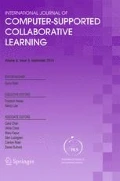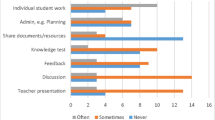Abstract
Collaborative technologies offer a range of new ways of supporting learning by enabling learners to share and exchange both ideas and their own digital products. This paper considers how best to exploit these opportunities from the perspective of learners’ needs. New technologies invariably excite a creative explosion of new ideas for ways of doing teaching and learning, although the technologies themselves are rarely designed with teaching and learning in mind. To get the best from them for education we need to start with the requirements of education, in terms of both learners’ and teachers’ needs. The argument put forward in this paper is to use what we know about what it takes to learn, and build this into a pedagogical framework with which to challenge digital technologies to deliver a genuinely enhanced learning experience.







Similar content being viewed by others
References
Cook, J., Bradley, C., Lance, J., Smith, C., & Haynes, R. (2007). Generating learning contexts with mobile devices. In N. Pachler (Ed.), Mobile learning: Towards a research agenda (Vol. 1, pp. 25–38). London: WLE Centre for Excellence, Institute of Education.
Cress, U., & Kimmerle, J. (2008). A systemic and cognitive view on collaborative knowledge building with wikis. International Journal of Computer-Supported Collaborative Learning, 3(2), 105–122.
Dewey, J. (1938). Experience and education. New York: Kappa Delta Pi.
Dillenbourg, P., & Traum, D. (2006). Sharing solutions: persistence and grounding in multimodal collaborative problem solving. Journal of the Learning Sciences, 15(1), 121–151.
Dillenbourg, P., Baker, M., Blaye, A., & O’Malley, C. (1996). The evolution of research on collaborative learning. In E. Sspada, & P. Reiman (Eds.), Learning in humans and machine: Towards an interdisciplinary learning science (pp. 189–211). Oxford, UK: Elsevier.
Gagné, R. M. (1970/1997). The Conditions of Learning (3rd ed.). New York: Holt, Rinehart and Winston.
Hmelo-Silver, C. E. (2003). Analyzing collaborative knowledge construction: multiple methods for integrated understanding. Computers & Education, 41, 397–420.
Jermann, P., & Dillenbourg, P. (2003). Elaborating new arguments through a CSCL script. In J. Andriessen, M. Baker, & D. Suthers (Eds.), Arguing to learn: Confronting cognitions in computer-supported collaborative learning environments (pp. 205–226). Dordrecht, Netherlands: Kluwer.
Kobbe, L., Weinberger, A., Dillenbourg, P., Harrer, A., Hamalainen, R., Hakkinen, P., et al. (2007). Specifying computer-supported collaboration scripts. International Journal of Computer-Supported Collaborative Learning, 2(2), 211–224.
Kolb, D. A. (1984). Experiential learning: experience as the source of learning and development. Englewood Cliffs, NJ: Prentice-Hall.
Laurillard, D. (2002). Rethinking university teaching: A conversational framework for the effective use of learning technologies (2nd ed.). London: RoutledgeFalmer.
Laurillard, D. (2007). Pedagogical forms for mobile learning: Framing research questions. In N. Pachler (Ed.), Mobile learning: Towards a research agenda (Vol. 1, pp. 153–175). London: WLE Centre for Excellence, Institute of Education.
Luckin, R. (2003). Between the lines: documenting the multiple dimensions of computer-supported collaborations. Computers & Education, 41(4), 379–396.
Luckin, R., Plowman, L., Laurillard, D., Stratfold, M., Taylor, J., & Corben, S. (2001). Narrative evolution: learning from students talk about species variation. International Journal of Artificial Intelligence in Education, 12, 100–123.
Luhmann, N. (1995). Social systems. Palo Alto, CA: Stanford University Press.
Merrill, M. D. (1994). Instructional design theory. Englewood Cliffs, NJ: Educational Technology Publication.
Moss, J., & Beatty, R. (2006). Knowledge building in mathematics: supporting collaborative learning in pattern problems. International Journal of Computer-Supported Collaborative Learning, 1, 441–465.
Papert, S. (1980). Mindstorms: Children, computers, and powerful ideas. Brighton, Sussex: The Harvester.
Papert, S. (1991). Situating constructionism. In I. Harel, & S. Papert (Eds.), Constructionism: research reports and essays, 1985–1990 (pp. 1–11). Norwood, N.J.: Ablex Publishing Corporation.
Pask, G. (1976). Conversation theory: Applications in education and epistemology. Amsterdam: Elsevier.
Piaget, J. (1977). Problems of equilibration. In M. H. Appel, & L. S. Goldberg (Eds.), Topics in cognitive development (Vol. 1, pp. 3–14). New York: Plenum.
Reigeluth, C. M. (1983). Instructional-design theories and models: An overview of their current status. Mahwah, NJ: Lawrence Erlbaum Associates.
Roschelle, J., & Teasley, S. D. (1995). The construction of shared knowledge in collaborative problem solving. In C. O’Malley (Ed.), Computer-supported collaborative learning (pp. 69–97). Berlin, Germany: Springer.
Scardamalia, M. (2004). CSILE/Knowledge forum®. In A. Kovalchick, & K. Dawson (Eds.), Education and technology: An encyclopedia (pp. 183–192). Santa Barbara, CA.: ABC-CLIO, Inc.
Scardamalia, M., & Bereiter, C. (1994). Computer support for knowlege-building communities. Journal of the Learning Sciences, 3(3), 265–283.
Scardamalia, M., & Bereiter, C. (2006). Knowledge building: Theory, pedagogy and technology. In K. Sawyer (Ed.), Cambridge handbook of the learning sciences (pp. 97–118). Cambridge, UK: Cambridge University Press.
Sharples, M., Taylor, J., & Vavoula, G. (2007). A theory of learning for the mobile age. In R. Andrews, & C. Haythornthwaite (Eds.), The Sage handbook of e-learning research (pp. 221–247). London: Sage Publications Ltd.
Turcsányi-Szabó, M. (2007). Collaborative trails: The role of trails in structuring and regulating collaboration. In J. Schoonenboom, M. Levene, J. Heller, K. Keenoy, & M. Turcsnyi-Szabo (Eds.), Trails in education: Technologies that support navigational learning (pp. 59–84). Amsterdam: Sense Publishers.
Vygotsky, L. (1962). Thought and language. Cambridge MA: MIT.
Vygotsky, L. S. (1978). Mind in society: The development of higher psychological processes. Cambridge, MA.: Harvard University Press.
Weinberger, A., Ertl, B., Fischer, F., & Mandl, H. (2005). Epistemic and social scripts in computer-supported collaborative learning. Instructional Science, 33(1), 1–30.
Wertsch, J. V. (1985). Cultural, communication, and cognition: Vygotskian perspectives. Cambridge: Cambridge University Press.
White, T. (2006). Code talk: Student discourse and participation with networked handhelds. International Journal of Computer-Supported Collaborative Learning (ijCSCL), 1(3), 359–382.
Author information
Authors and Affiliations
Corresponding author
Annex 1: A summary of the conversational framework
Annex 1: A summary of the conversational framework
The Conversational Framework poses the following checklist of questions to the learning activities planned for a learning session. Each question checks an action cycle in the Framework. Numbers in brackets refer to Fig. 5.
Do they motivate students to:
-
1.
access explanations and presentations of the theory, ideas or concepts (1, 6)?
-
2.
ask questions about their understanding of the theory, etc, by providing the opportunity for answers from the teacher (2, 3), or their peers (10, 11)?
-
3.
offer their own ideas and conceptual understanding, by providing comment on them from the teacher, or their peers?
-
4.
use their theoretical understanding to achieve a clear task goal by adapting their actions in the light of their understanding (5, 6, 7), or in response to comments (10, 11) or feedback (8)?
-
5.
repeat practice, by providing feedback on actions that enables them to improve performance (5, 6, 7, 8)?
-
6.
repeat practice, by enabling them to share their trial actions with peers, for comparison and comment (13, 14, 15, 16, 17)?
-
7.
reflect on the experience of the goal-action-feedback cycle, by offering repeated practice at achieving the task goal (5, 6, 7, 8, 9, 12, 19, 20, 21)?
-
8.
discuss and debate their ideas with other learners (10, 11)?
-
9.
reflect on their experience, by having to articulate or produce their ideas, reports, designs, performances, etc. for presentation to their peers (13, 14, 15, 16)?
-
10.
reflect on their experience, by having to articulate or produce their ideas, reports, designs, performances, etc. for presentation to their teachers (21, 22)?
Rights and permissions
About this article
Cite this article
Laurillard, D. The pedagogical challenges to collaborative technologies. Computer Supported Learning 4, 5–20 (2009). https://doi.org/10.1007/s11412-008-9056-2
Received:
Accepted:
Published:
Issue Date:
DOI: https://doi.org/10.1007/s11412-008-9056-2




